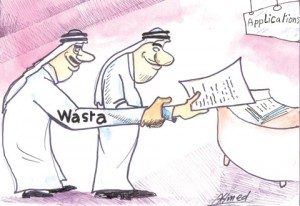My artifacts this week focus on the social networking practice of wasta in the Arab world. From Connected in Cairo I bookmarked Wasta, Work and Corruption in Transnational Business. The article is written by anthropologist who was called in to mediate for a transnational corporation as a cultural consultant regarding a presence of wasta. The company’s newest hire hired his cousin, upsetting the supervisors whom pride their business as one free from corrupt practices. The accused, Girgis, explained that if he was in any other region of the world he would run the office by the book, but being in the Middle East he must adhere to certain social norms. The author conveys that wasta plays a huge role in Arab economics and society, and references a research paper from the international business journal Cross Cultural Management titled The effect of Wasta on Perceived Competence and Morality, hence my second artifact. The paper conveys a deeper explanation of wasta and its effect on Arab economic and social progress, illuminating the linkage between wasta and poor job performance, economic decline, brain drain, and the festering of injustice and frustration among the masses in Arab countries. My past bookmarks focused on the road blocks to democracy in the Middle East, showing that before we can set a focus on the establishment of a governance structure we must first address economic prosperity and strengthen social and economic institutions, ultimately reducing poverty and unemployment and creating a mass population of people ready and able to participate in politics. These articles emphasize one of the biggest problems in the establishment of a stable economy. After our class discussion about privatization and crony capitalism in Egypt, selling state industries to Egyptian officials, I really started to comprehend the fundamental issues inhibiting capitalism, or successful economies in general, in Arab states. Digging deeper and understanding wasta is vital in understanding Middle Eastern politics, economics and society, its literally the force behind all components of Arab culture. Their focus on collective ties and social networks for hiring processes undermines equality, competition, and diversity, which are all crucial components to a capitalist economic system. The biggest road block in economic prosperity in the Middle East is the lack of wealth distribution, the majority of it being concentrated in the hands of the few elites. Wasta facilitates this concentration by eliminating competition for those who do not possess wasta, i.e. the masses. Businesses hire based on social ties which means certain social groups will hold some degree of power that the masses cannot achieve. Like how ruling parties are in the form of regimes comprised of a social or religious group, concentrating all wealth and power in the hands of that minority, economic and social businesses and organizations run parallel. Because there’s usually not a capable government in place to effectively eliminate this practice, it flourishes. The masses who lack the advantage of social ties live in unemployment and poverty, festering civil strife and intensifying frustrations over inequality.
